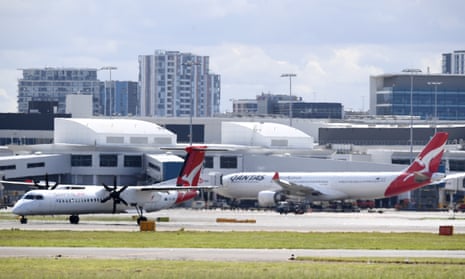The Australian aviation industry will receive a $715m relief package, as the federal government waives a range of fees to help support the sector, reeling from the effects of the coronavirus and associated travel restrictions.
The package, announced on Wednesday, will see the government waive fees including aviation fuel excise, Airservices charges on domestic airline operations and domestic and regional aviation security charges.
The measures will be backdated to 1 February, resulting in an estimated reimbursement of $159 million for applicable charges already paid by domestic airlines.
The package comes as Virgin Australia announced it will suspend all international flights from 30 March to 14 June, with a 50% reduction in domestic flights in the same period.
The measures will result in the “temporary grounding” of the equivalent of 53 aircraft, the carrier announced on Wednesday.
Australia’s aviation and tourism sectors have suffered from a massive drop-off in international visits to Australia and new requirements that all international arrivals self-isolate for 14 days.
On Tuesday the Department of Foreign Affairs and Trade issued advice for Australians to return home as travel is becoming “more complex and difficult”.
Virgin Australia said it will also “operate a reduced international schedule between now and 29 March to enable Australians to return home”.
In addition to a $17.6bn stimulus package announced last Thursday targeting welfare recipients and businesses, the government is expected to unveil a second tranche of stimulus including industry support for sectors affected by Covid-19 including tourism, events, hospitality, sports and the arts.
The infrastructure minister Michael McCormack said the aviation relief package “demonstrates our commitment to supporting the aviation sector as we put Australia in the best position possible to deal with the Covid-19 outbreak”.
“Our airlines run on tight budgets at the best of times and these past few weeks have been particularly tough,” he said.
“I’ve been speaking with Australian airline executives every day and will continue to work with them to make sure they receive the support they need.
“Providing this assistance not only helps our airlines but also the entire aviation industry, regional Australians in particular and other industries such as tourism and trade, which depend on aviation.”
On Tuesday Qantas said it would be closing 90% of international flights and 60% of domestic flights from the end of the month.
The new cuts are dramatically higher than cuts announced just last week.
Passengers affected by flight cancellations can ask airlines for credit for future flights.
Internationally, analysts predict the coronavirus pandemic will bankrupt most of the world’s airlines by the end of May.
Labor’s shadow infrastructure minister, Catherine King, said the $715m package is “a welcome first step but it is highly likely that much more will be needed”.
The Transport Workers Union national secretary Michael Kaine said that waiving fees for some airlines “is not going to save jobs”.
“Today we have companies representing thousands of baggage handlers, ramp workers, caterers, cleaners, drivers, cabin crew and security personnel facing a tough challenge,” he said.
“They are trying to stay open but it is becoming increasingly difficult and lay offs of labour hire staff have begun.”
On Tuesday, the trade minister, Simon Birmingham, said he had spoken to Qantas and Virgin and “both assure me at present of their viability” because they have “significant cash reserves” despite being under “immense pressure”.
Birmingham said “a strong airline sector in Australia in the future is not negotiable”, citing their role in a future economic recovery and maintaining regional connectivity.
While Qantas made deep cuts on Tuesday, market speculation about which airline is in the most financial strife centres on Virgin.
On Monday night, ratings agency S&P cut Virgin’s credit grade from B to B- and signalled it could be downgraded further.
In a bid to bring revenue forward, Virgin has slashed the price of domestic flights by up to 35% and offered people who book before next Monday a share of 10m frequent flyer points.
Airlines are also desperately trying to conserve cash to get through the next few months by getting staff to take their leave, or leave without pay.
But they are reluctant to make workers redundant because that would involve spending money from the very pot they are trying to preserve.
